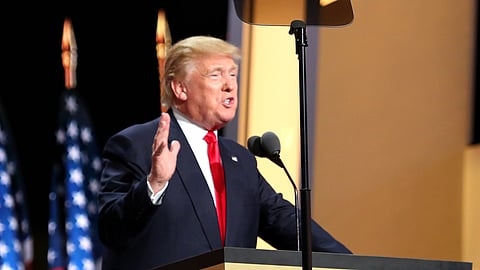

U.S. President Donald Trump announced on Friday that his administration will forgo negotiating individual trade agreements and instead inform countries of their new tariff rates via formal letters. The move marks a significant departure from traditional trade diplomacy, as the White House will now unilaterally set tariff levels for over 150 nations.
“It’s not possible to meet with every country,” Trump said during a business roundtable in Saudi Arabia, adding that his administration would soon begin sending notices detailing the updated tariff rates. Countries are expected to receive this information within two to three weeks.
The announcement follows Trump’s April 2nd declaration of “Liberation Day,” during which the administration imposed steep reciprocal tariffs on dozens of countries, citing longstanding trade imbalances and the need to reindustrialize the United States. The abrupt policy caused widespread volatility in global markets and sparked concern among foreign debt holders, who play a key role in financing the U.S.’s $36 trillion national debt.
In response to market panic and pressure from bondholders, Trump introduced a 90-day pause on the tariffs to negotiate deals with each country, reducing most baseline rates to 10%—with the exception of China, who retaliated with tit-for-tat tariffs, which led to a rapid escalation and eventually 125% and 145% tariffs being placed on Beijing and Washington respectively.
Though administration officials framed the standoff as a strategic effort to economically isolate China, critics questioned whether the tariffs had achieved their intended industrial policy goals or simply triggered a costly geopolitical trade war. While some administration allies claimed the tariff pause was a tactical maneuver, the pause was largely seen as a walk back from the policy
On Monday, the U.S. and China reached a temporary agreement to lower tariffs by 115 percentage points each, bringing average rates down to 30% on Chinese goods and 10% on U.S. exports.
Despite initial claims from the Trump administration that dozens of countries were contacting Washington in hopes of negotiating deals, only the United Kingdom has signed a formal agreement. It remains unclear whether any other substantive negotiations are underway.
Trump had previously stated that he would pursue individual agreements with every country. His latest announcement—eschewing negotiation in favor of unilateral notification—represents a significant walk-back of that promise and a possible retreat from the administration’s broader tariff policy as initially framed.
Critics also point to the example of Apple, which recently announced it would shift part of its supply chain from China to India. Trump criticized the move, seeing it as a failure of his tariff policy to bring production back to the United States, undermining his administration's stated objective of domestic reindustrialization.
As of now, the White House has not specified what tariff rates will be applied to which countries, though Trump indicated the final decisions are forthcoming.